Bulgaria: The bank guarantees for Nabucco to be excluded from the budget deficit
Ralitsa Kovacheva, December 15, 2010
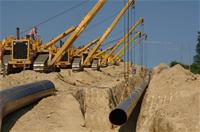 Two months ago euinside wrote, that Bulgaria has surprisingly declared its demand the contributions for the construction of the Nabucco pipeline, due by EU countries participating in the project, to be recognised by the Union as targeted costs and not be included in the national budget deficit. About this position we have learned by an official press release from the Bulgarian government press office after the meeting of Prime Minister Boyko Borissov with US Special Energy Envoy for Eurasia Richard Morningstar. In this sense, even more surprising was the fact that such a demand was first shared not in Brussels or Sofia, but in Washington.
Two months ago euinside wrote, that Bulgaria has surprisingly declared its demand the contributions for the construction of the Nabucco pipeline, due by EU countries participating in the project, to be recognised by the Union as targeted costs and not be included in the national budget deficit. About this position we have learned by an official press release from the Bulgarian government press office after the meeting of Prime Minister Boyko Borissov with US Special Energy Envoy for Eurasia Richard Morningstar. In this sense, even more surprising was the fact that such a demand was first shared not in Brussels or Sofia, but in Washington.
euinside immediately sent questions to the European Commission, where we received a reserved reply from, saying “any information about an official request from the Bulgarian authorities to recognise the contribution for the construction of Nabucco as a targeted expenditure has not been received so far, so no comment is possible.”
Although we have sent our questions to the Commission and to the Bulgarian government press office simultaneously - on September 21st, we had to wait more than a week to get some answers from the Bulgarian authorities. We have never received a formal letter, but we found that yet there wasn't any official position on the issue, nor something had been submitted to the Commission or the Council in Brussels, but there were some informal consultations between Sofia and the countries participating in the Nabucco project.
The news did not develop in the next two months until Boyko 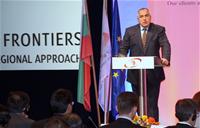 Borissov inspired it with a new life. At the Energy conference for Southeast Europe, held in Sofia on November 30, Borissov called for the bank guarantees which EU Member States will have to take by European financial institutions to realise the Nabucco project not to be calculated in their budget deficits:
Borissov inspired it with a new life. At the Energy conference for Southeast Europe, held in Sofia on November 30, Borissov called for the bank guarantees which EU Member States will have to take by European financial institutions to realise the Nabucco project not to be calculated in their budget deficits:
“My suggestion to Brussels is the bank guarantees that we, the countries participating in Nabucco, take, to be taken out in parentheses, behind the total number of deficits in these countries. Otherwise ... we will immediately have a budget deficit and the efforts of the government, of all of us, will be pointless.”
Only two weeks after Sofia and Moscow have established a joint venture for the Russian South Stream project, the Bulgarian prime minister criticised EU institutions for the pace, by which the European project Nabucco is being implemented: "We have always displayed Nabucco as a priority project of ours because it is such for the European Union, and we have done everything on it. But I have many, many observations on the rate at which this project is being implemented and in terms of its actual, real elevation as an EU priority”.
 By the way, it is important to note that Bulgaria is persistently stressing its loyalty to Nabucco, after signing the agreement with Moscow on November 13th. Only 10 days later, Foreign Minister Nickolay Mladenov said in Vienna: "I fully support the pipeline because it is a priority project for Bulgaria in terms of achieving diversification of gas supplies and reducing the energy dependence of the country. As an essential element of the Southern Corridor and as a priority European project, approved by the Commission, the Nabucco pipeline is key to security of gas supplies for the entire continent.”
By the way, it is important to note that Bulgaria is persistently stressing its loyalty to Nabucco, after signing the agreement with Moscow on November 13th. Only 10 days later, Foreign Minister Nickolay Mladenov said in Vienna: "I fully support the pipeline because it is a priority project for Bulgaria in terms of achieving diversification of gas supplies and reducing the energy dependence of the country. As an essential element of the Southern Corridor and as a priority European project, approved by the Commission, the Nabucco pipeline is key to security of gas supplies for the entire continent.”
The words "a priority European project, approved by the Commission” are very important because, despite all attempts of the Prime Ministers of Bulgaria and Russia to present South Stream as a “European” project, formally it is not the case, unlike Nabucco.
Going back to Bulgaria's demand the bank guarantees for Nabucco not to be calculated in the budget deficit, in his speech at the energy conference in Sofia, Boyko Borissov has offered Ministers from Southeast Europe to make specific recommendations on the topic which to be presented to the European Commission.
An official release of the Bulgarian Ministry of Economy and Energy says that  a declaration had been signed, according to which the countries of Southeast Europe would jointly elaborate a ten-year plan for developing networks for electrical energy and natural gas in the region in accordance with the European legislative acts on the liberalisation of the EU's internal market.
a declaration had been signed, according to which the countries of Southeast Europe would jointly elaborate a ten-year plan for developing networks for electrical energy and natural gas in the region in accordance with the European legislative acts on the liberalisation of the EU's internal market.
In the declaration, the parties also engage to enhance cooperation with international financial institutions to provide financial support for the development of energy infrastructure. According to the document, “an integrated and liquid energy market in the region is a top priority for the countries of Southeast Europe. It will help both to diversify energy supplies and to increase energy security across the European Union.”
As it is clear, at least from this press release, the declaration makes no mention of the the Prime Minister's demand regarding Nabucco. Anything alike was written in the documents published after the Transport, Telecommunications and Energy Council in Brussels, where Bulgarian Energy Minister Traycho Traykov had informed his EU colleagues about the energy conference and the Declaration.
 Within the Council, Ministers held a political debate on the new European energy strategy 2011-2010, given the upcoming European Council meeting in February 2011. The Summit will be dedicated entirely on the energy issue. Maybe then there will be more clarity in terms of Bulgaria's position on Nabucco.
Within the Council, Ministers held a political debate on the new European energy strategy 2011-2010, given the upcoming European Council meeting in February 2011. The Summit will be dedicated entirely on the energy issue. Maybe then there will be more clarity in terms of Bulgaria's position on Nabucco.
As you know, this is not the first demand Bulgaria is making for the exclusion of certain public expenditure from the budget deficit - our country is among 9 EU member states, which have asked the costs of pension reforms to be deducted from the deficits. On this occasion, in an interview with euinside, EU Commissioner for Internal Market and Services Michel Barnier said: “The European Commission still does not have a definite opinion, because at this stage analyses are being made of the real deficit in the Member States. Consideration should be given to the problem of indebtedness and only when we have additional elements, perhaps the European Commission will be able to say something more definite.”
Probably this condition applies to the request of Sofia for Nabucco too. The project was announced as an EU priority, but the work on its implementation is going slowly, although the raising of the needed 4 billion euro funding has already started. Up to 2 billion euro will be provided by the European Investment Bank, up to 1.2 billion euro - by the European Bank for Reconstruction and Development and up to 800 million euro - by the International Finance Corporation. In terms of EU Member States participating in the project, the European Commission has allocated 200 million euro for the construction of the Nabucco gas pipeline, part of which are intended for Bulgaria.
 The Nabucco shareholders (with 16.67% each) are the Bulgarian Energy Holding (Bulgaria), Botas (Turkey), MOL (Hungary), OMV (Austria), RWE (Germany) and Transgaz (Romania). They are responsible for providing gas supply contracts, which will enable Nabucco fulfill its purpose: to achieve “energy security via the diversification of gas routes and gas supplies”. For this purpose, gas supplies must be ensured from the Middle East and the Caspian region. According to information from the Nabucco international company from August 23rd, the pipe will receive gas from Azerbaijan, Turkmenistan and Iraq.
The Nabucco shareholders (with 16.67% each) are the Bulgarian Energy Holding (Bulgaria), Botas (Turkey), MOL (Hungary), OMV (Austria), RWE (Germany) and Transgaz (Romania). They are responsible for providing gas supply contracts, which will enable Nabucco fulfill its purpose: to achieve “energy security via the diversification of gas routes and gas supplies”. For this purpose, gas supplies must be ensured from the Middle East and the Caspian region. According to information from the Nabucco international company from August 23rd, the pipe will receive gas from Azerbaijan, Turkmenistan and Iraq.
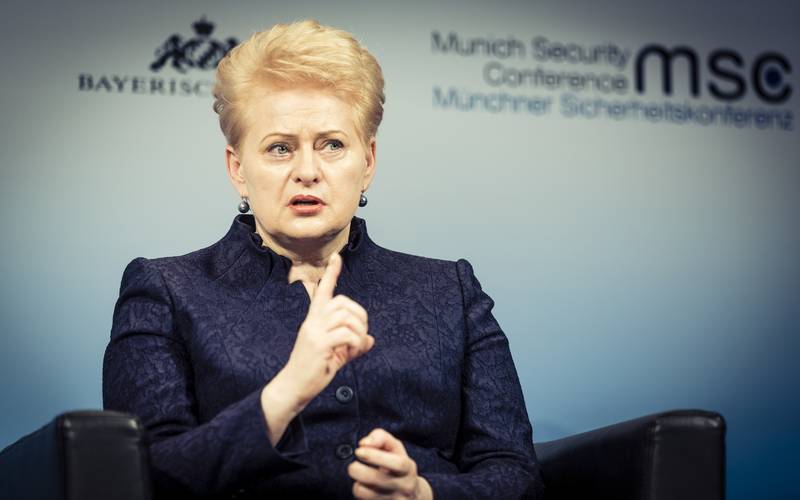 Dalia Grybauskaite | © MSC/Koerner
Dalia Grybauskaite | © MSC/Koerner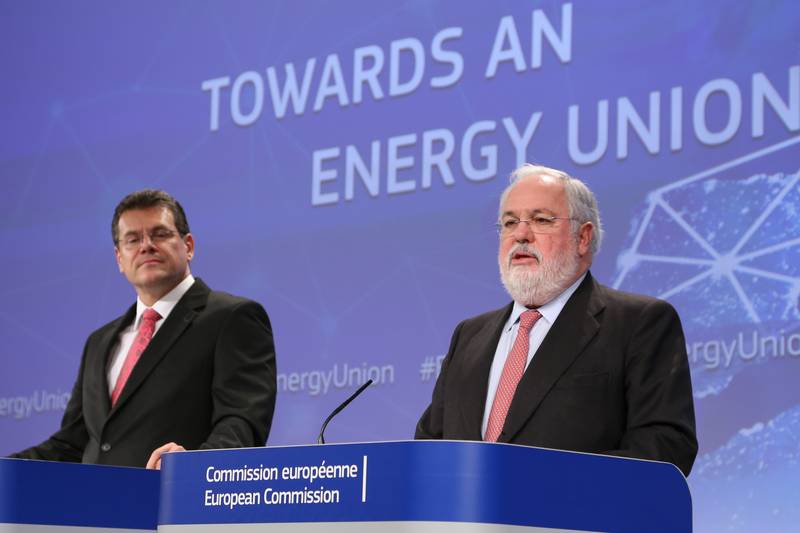 Maros Sefcovic, Miguel Arias Canete | © European Commission
Maros Sefcovic, Miguel Arias Canete | © European Commission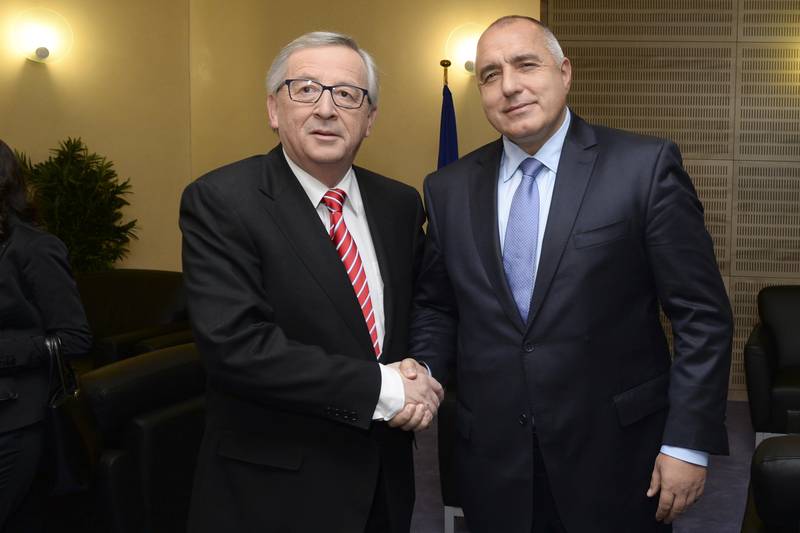 Jean-Claude Juncker, Boyko Borissov | © European Commission
Jean-Claude Juncker, Boyko Borissov | © European Commission